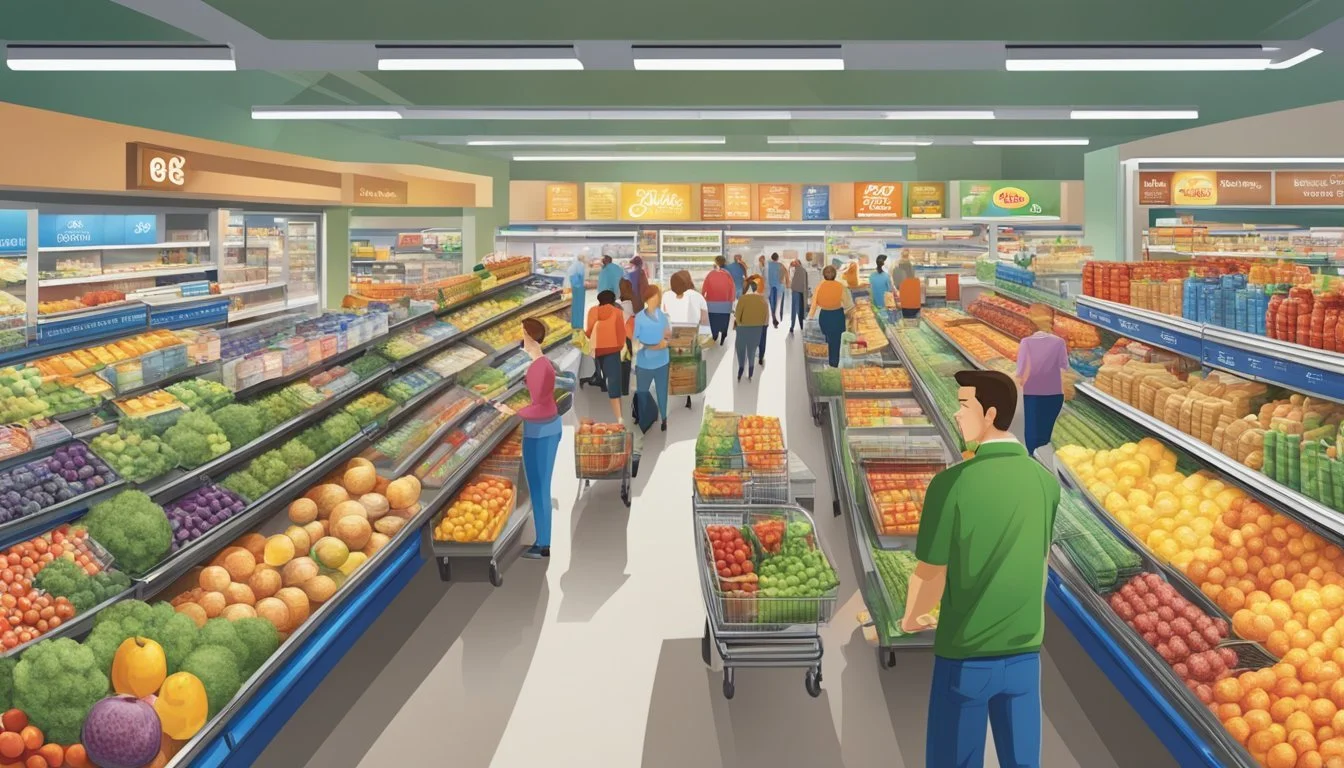Kroger vs Lidl
Comparing Value, Variety, and Shopping Experience
When it comes to grocery shopping, consumers are often on the lookout for the best balance between quality and cost. Two prominent players in the grocery store market are Kroger and Lidl. Kroger, an established American retail company, offers a wide range of products including grocery items, pharmacy services, and jewelry stores. Lidl, on the other hand, is a German global discount supermarket chain that is relatively new to the US market, yet has rapidly established a reputation for its affordability and European products.
The debate between Kroger and Lidl largely hinges on pricing, product variety, and shopping experience. Kroger is known for its frequent sales, loyalty programs, and a larger assortment of goods including its own private labels. Lidl's business model focuses on simplicity and cost-saving strategies, such as a smaller store footprint and limited product selection, which often translates to lower prices for customers.
Evaluating these two grocery chains to determine which one is "better" is inherently subjective and depends upon individual shopper priorities. For some, the depth and breadth of Kroger's offerings, along with its promotional deals, make it a preferred choice. For others, the economical prices and unique European products at Lidl might hold more appeal. Each store presents its unique advantages, often compelling customers to choose based on their specific shopping needs and budget constraints.
Company Profiles
In the competitive grocery store market, both Kroger and Lidl present themselves as substantial players. Here, their profiles are presented to aid in understanding their market positions and operational scales.
Kroger
Kroger stands as one of America's largest grocery chains. With a history that spans over a century, it has established a robust market presence. According to ratings on Knoji, Kroger has garnered an overall score of 4.4 based on multiple customer ratings. Kroger operates a variety of supermarkets, hypermarkets, and department stores, providing a vast range of products and services to consumers across multiple states.
Headquarters: Cincinnati, Ohio, USA
Number of Locations: Over 2,700 stores
Revenue: Reports indicate a substantial annual revenue, showcasing its financial stability.
Market Positioning: Kroger frequently positions itself through quality customer service and a wide selection of goods, including private label products.
Lidl
Lidl, a leading international grocery retailer, has proven to be a strong competitor in the grocery sector. Originating in Germany, Lidl has successfully expanded its operations internationally. As per Knoji, Lidl's overall score stands at 4.1, which reflects substantial customer satisfaction. It competes against other popular groceries by offering a selection of products at competitive prices.
Headquarters: Neckarsulm, Germany
Number of Locations: More than 12,000 stores worldwide
Revenue: In 2022, Lidl reported impressive sales of 114.8 billion euros, indicating significant growth.
Market Positioning: Lidl is known for its discount pricing strategy and efficient store layouts, catering to budget-conscious consumers without compromising on quality.
Price Analysis
When comparing Kroger and Lidl, two prominent grocery chains, price is a critical factor for consumers looking to save money on their shopping. Prices at Kroger have been found to be competitively lower in comparison to Lidl, offering customers significant savings.
Price Comparison
A study highlighted by "Low Dough Family" indicated a substantial price difference between the two stores. For a set of 46 items, Kroger's total came to $107.75, while Lidl had a higher total of $138.13. This reflects a difference of $30.38, making Kroger about 22% cheaper than Lidl for that particular shopping list.
Kroger: $107.75 (46 items)
Lidl: $138.13 (46 items)
Deals and Savings
Kroger is known for its range of deals and savings opportunities. Customers can take advantage of weekly sales, digital coupons available through Kroger's mobile app, and savings from the Kroger Plus loyalty program. Furthermore, the presence of a Lidl store in the vicinity has shown to drive down prices at competing stores. A study mentioned a decrease in the price for a half-gallon of milk by 55% in markets where Lidl operates compared to those without a Lidl, indicating that competition can lead to significant savings for consumers.
The cost-saving impact of Lidl's entry into new markets has prompted nearby grocers, such as Kroger, to adjust their pricing strategy, which benefits price-conscious shoppers.
Weekly sales
Digital coupons
Loyalty program discounts
Product Assortment
When analyzing Kroger and Lidl, it is important to assess their product assortment, which includes fresh produce, meat and dairy products, store brand offerings, and the range of goods available to shoppers.
Produce Quality
Kroger offers a diverse range of fresh produce, often including organic options. Customers can find a robust selection of fruits and vegetables that are frequently restocked to maintain freshness. Lidl also provides a variety of fresh produce, with an emphasis on seasonal and regional products, which often results in highly fresh options that cater to local tastes.
Meat and Dairy Selection
The meat and dairy selection at Kroger is comprehensive, featuring various cuts of meat and a wide array of dairy products. Customers have access to both standard and specialty items, including organic and grass-fed options. Meanwhile, Lidl's meat and dairy section includes competitively priced standard products, with a focus on value and affordability.
Store Brand Offerings
Kroger is known for its extensive range of store brand products, which cover a vast spectrum from pantry staples to gourmet items. Kroger's store brands, such as 'Simple Truth' and 'Private Selection', are positioned to offer quality at a reduced price point. On the other hand, Lidl heavily features its store brands across various categories, providing shoppers with lower-cost alternatives to national brands.
Limited Selection Impacts
Kroger stores typically provide a large selection, including more niche products like ethnic foods, specialty frozen foods, and an extensive range of canned goods. The wide variety allows for a one-stop shopping experience. Lidl's selection is more curated, which can lead to lower prices but might limit consumer choice. This limited selection includes a smaller range of products across categories like frozen foods and dry groceries, which can affect shoppers looking for specific items not found within Lidl's streamlined inventory.
Shopping Experience
When comparing Kroger and Lidl, shoppers will notice differences in store layout and checkout efficiency, impacting their overall shopping experience.
Store Layout
Kroger offers a familiar store layout for American shoppers, often featuring wide aisles and clear signage that guides them through various departments such as produce, bakery, and dairy. They typically provide a large selection of both branded and private-label products. Shoppers can navigate through Kroger with relative ease thanks to the logical organization and availability of shopping carts conveniently placed at the store entrance.
Lidl, on the other hand, presents a more streamlined approach. The layout is designed to facilitate a quick shopping trip, with most stores following a straightforward "racetrack" layout that leads shoppers through the store. They place a strong emphasis on their private-label brands, with these items prominently displayed. The produce section is usually at the entrance, greeting customers with fresh produce options, though it may be more limited compared to Kroger.
Checkout Efficiency
Kroger has invested in technology to speed up the checkout process. Many stores offer self-checkout lanes, which allow customers to scan and pay for their groceries quickly, especially if they have a smaller basket. Traditional checkout lanes are also available, with cashiers assisting shoppers for a more personal service.
Lidl prioritizes efficient checkouts as well, typically with a smaller number of checkout lanes than Kroger but with a design that is optimized for speed. Their checkout area is structured for quick scanning, and employees are trained to be fast and accurate. Unlike Kroger, Lidl does not widely offer self-checkout options, which could lead to longer waits during peak shopping hours but maintains a consistent, swift process during less busy times.
Customer Services
When comparing Kroger and Lidl, both retail chains aim to provide satisfactory customer services, but they have unique approaches in their return policies and customer support.
Return Policies
Kroger operates with a reasonably flexible return policy, allowing customers to return most products with or without receipts, which may result in exchange or store credit. Perishable goods have certain limitations but can often be returned if there is a quality issue.
Lidl also offers a return policy with customer satisfaction in mind. They allow returns for most products with a receipt, and sometimes even without a receipt, depending on the manager’s discretion and item condition. The focus is on a hassle-free experience, as illustrated by their "Lidl Love It Guarantee" on their own brands, which promises refunds and replacements on their products.
Customer Support
Kroger provides customer support through various channels including phone, email, and live chat services, ensuring multiple touchpoints for customer inquiries. In-store customer service desks aid with immediate concerns, and their social media platforms are responsive to customer feedback.
Lidl's approach to customer support encompasses in-store assistance with staff trained to help customers on the shop floor. For non-urgent matters, they offer a customer hotline and an email support system. Lidl does not extensively promote a live chat service.
Both Kroger and Lidl prioritize accessible customer service to ensure a satisfactory shopping experience for their customers.
Availability and Accessibility
In comparing Kroger and Lidl, a key factor for consumers is how easily they can access each grocery store. This encompasses both the location of physical stores and the availability of online grocery shopping options.
Location Convenience
Kroger operates a vast network of store locations throughout the United States. With over 2,700 stores across the country, it has a substantial footprint, especially in the Midwest and Southern regions. Customers can typically find a Kroger store in most urban and suburban areas, making it highly accessible for in-person shopping.
Lidl, on the other hand, has a more limited presence in the United States, with around 150 stores concentrated mainly on the East Coast. However, its expansion strategy is rapidly unfolding, leading to increased store count and potentially broader coverage in the future.
Online Grocery Options
Kroger has a significant online presence through its website kroger.com, offering comprehensive online grocery shopping and delivery services. Customers can place orders directly through the site or via their Facebook page, using various services for pickup or delivery that include third-party options like Instacart.
Lidl's approach to online groceries differs as it currently emphasizes in-store shopping experiences over online shopping in the US market. While Lidl does offer an online presence through lidl.de and other international sites, the focus on e-commerce and delivery services is not as pronounced as Kroger. This may affect customers who prefer the convenience of online grocery ordering.
Brand Comparisons
When considering which grocery store is better, analyzing how Lidl and Kroger stack up against other brands offers valuable insights.
Lidl vs Other Brands
Lidl has positioned itself as a contender in the budget-friendly market segment, rivaling chains such as Aldi and Walmart. It provides competitive pricing, often considered on par with or even better than Aldi in many aspects. For instance, Lidl's pricing strategy and store brand quality consistently challenge similar offerings from Walmart. The store is known for its relatively lower prices on everyday items such as bread and chicken when compared to Publix or Harris Teeter.
However, where brands like Trader Joe’s and Whole Foods establish themselves with a distinct product range focusing on organic and specialty products, Lidl's selection is more generalized, though it still includes its 'Simply Nature' range that competes with these health-centric brands.
Costco and Sam's Club, being membership warehouse clubs, offer a different value proposition with bulk purchasing options which Lidl currently does not match; instead, Lidl keeps a selection and business model similar to traditional grocery stores like Aldi and Food Lion.
Kroger vs Other Brands
On the other hand, Kroger is more of an all-rounder in the grocery landscape. They have a diverse inventory that allows them to compete with a wide range of grocery stores, from Walmart to Safeway and Target. Their prices have been found to be lower than those of Lidl, according to a direct price comparison of 46 items, which underscores Kroger's competitiveness in the market.
Additionally, the variety and quality of Kroger's store brands make it a worthy opponent to Publix and Harris Teeter. While brands like Amazon have ventured into the grocery space with their acquisition of Whole Foods, Kroger remains steadfast with a longstanding presence in physical retail, supplemented by their own online ordering and delivery services.
Kroger's expansive store brand range means customers can find anything from budget-friendly essentials to premium-quality products under their private labels, a strategy similar to that used by Target with their in-house brands. Compared to specialty stores like Trader Joe's or organic-focused Sprouts Farmers Market, Kroger offers a broader variety which includes these niche markets within its comprehensive product range.
Where Wegmans and The Fresh Market may excel in prepared food offerings and customer experience, Kroger competes by leveraging its size to offer a wide variety of products while also maintaining a strong focus on customer loyalty programs and discounts.
Sustainability and Ethics
When assessing Kroger and Lidl, their approaches to sustainability and ethics are comprehensive, addressing environmental impact and sourcing practices that are crucial in today's market. Both corporations have made commitments to eco-friendly practices and ethical sourcing to various extents.
Eco-Friendly Practices
Kroger has implemented several sustainability initiatives, particularly aimed at creating a resilient food system. This includes reducing greenhouse gas emissions and enhancing the sustainability of their operations. Kroger's 2023 Environmental, Social & Governance Report outlines their strategy with clear goals and achievements, which incorporate climate-related risks and opportunities.
On the other hand, Lidl has received a favorable sustainability rating, indicating a strong commitment to environmental responsibility. The store’s efforts include energy efficiency and waste reduction measures. Its score of 4.1/5 on sustainability platforms suggests that Lidl is proactive in maintaining eco-friendly retail practices.
Ethical Sourcing
Both Kroger and Lidl place a substantial emphasis on the ethical sourcing of their products. Kroger recognizes its crucial role in the food supply chain and strives for sustainability in its product sourcing, including produce, meat, dairy, and eggs. They are helping to shift towards more responsible production methods.
Lidl also adopts an ethical approach to sourcing, with particular attention to the freshness and quality of their produce and meat offerings. They are known for providing cage-free eggs and ensuring that the dairy products are sourced with a focus on animal welfare.
Through these efforts, both grocery chains demonstrate their commitment to ethical practices and sustainable, long-term food systems.
Market Trends and Consumer Behavior
This section examines the shifts within grocery shopping habits and how prominent retailers like Kroger and Lidl have adapted to these industry changes.
Shopping Habits Study
Recent consumer studies indicate that Kroger and Lidl are catering to a more value-conscious and health-aware shopper. A McKinsey report suggests that 22% of consumers are focusing on spending less across all income groups. Preferences have also shifted towards healthier options, leading to increased sales of products such as bananas, greens, tomatoes, and lettuce at both grocery chains.
Adaptation to Market Changes
Kroger has demonstrated its ability to adapt by projecting sales growth between 0.25% and 1.75% for 2024, excluding fuel. This reflects a strong understanding of market trends and a commitment to meeting consumer demands. Lidl, on the other hand, has been responsive by expanding its value-priced private-label offerings to include more health-oriented products. Both have made significant strides in their online presence, acknowledging the enduring preference for online grocery shopping, which has kept a steadfast hold since the start of the pandemic.
Final Verdict
When comparing Kroger and Lidl, consumers should consider several factors to determine which grocery store better suits their needs. Kroger offers a vast selection of goods with competitive prices, making it a strong contender for budget-conscious shoppers seeking both value and variety.
Lidl, on the other hand, has gained recognition for its low-cost groceries. However, the selection of items available may be more limited when compared to Kroger's offerings. Where Lidl excels is in offering its customers a strong balance between affordability and product quality.
Both stores host regular deals which provide additional savings on top of their already economical pricing. Here’s how they stack up in key areas:
Value: Kroger generally provides a larger assortment of items at lower prices.
Quality: Lidl is known for high-quality store brands, often at a lower cost.
Products: Kroger offers more national brands, while Lidl focuses on its European-style house brands.
Shoppers should weigh these factors when choosing their preferred grocery store:
Criteria Kroger Lidl Deals Regular Frequent Product Quality Good Very Good Value Excellent Good Product Range Extensive Curated
In conclusion, each store has its strengths: Kroger for its deals and extensive product range, and Lidl for its quality and curated selections. Customers may choose Kroger for routine shopping and Lidl for specialty items or European goods.









